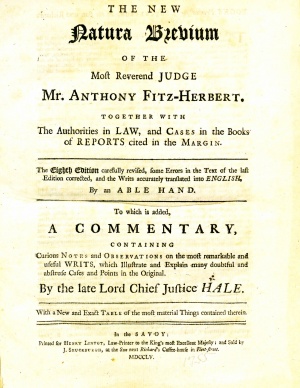Difference between revisions of "New Natura Brevium"
m |
(Summary paragraphs by Evan Feely.) |
||
| Line 2: | Line 2: | ||
===by Anthony Fitzherbert=== | ===by Anthony Fitzherbert=== | ||
__NOTOC__ | __NOTOC__ | ||
| − | + | {{BookPageInfoBox | |
| − | + | |imagename=FitzherbertNewNaturaBrevium1755TitlePage.jpg | |
| + | |link=https://catalog.swem.wm.edu/law/Record/529996 | ||
| + | |shorttitle=''The New Natura Brevium'' | ||
| + | |author=Sir Anthony Fitzherbert | ||
| + | |edition=Eighth, carefully revised | ||
| + | |publoc=London (In the Savoy) | ||
| + | |publisher=Printed for Henry Lintot and sold by J. Shuckburgh | ||
| + | |year=1755 | ||
| + | |pages=[12], 606, [42] | ||
| + | |lang=English | ||
| + | }} | ||
| + | ''The New Natura Brevium'' was a highly influential treatise on English law first issued in French in 1534 and written by Sir Anthony Fitzherbert (1470-1538), an English judge, scholar, and legal author.<ref>''Encyclopedia Britannica'', s.v. "Fitzherbert, Sir Anthony."</ref> Frequently cited in judgments for more than two hundred years following its publication,<ref>William Douthwaite, ''Gray’s Inn'' (London: Reeves and Turner, 1886), 46.</ref> ''The New Natura Brevium'' is an important article on 16th century common law.<br /> | ||
| + | <br /> | ||
| + | Fitzherbert had already published an abridgement of the “Year Books,” which are commonly recognized as being the earliest law reports of England.<ref>''Encyclopedia Britannica'', s.v. "Fitzherbert, Sir Anthony."</ref> In 1522 he was made a judge of common pleas and was knighted, although he continued to write and soon after published three works: one on law, one on agriculture, and one of law and agriculture combined.<ref>''Ibid."</ref><br /> | ||
| + | <br /> | ||
| + | However, it is for ''The New Natura Brevium'' that Fitzherbert remains most well-known. In it he touches on an array of legal issues ranging from the skill and care one is owed by an expert, the cause of action for a victim of fraud, and the scope of liability for trespasses on land.<ref>Douthwaite, ''Gray’s Inn.''</ref> His analysis was crucial to the development of English common law,<ref>''Ibid."</ref> and consequently the foundation of the United States’ legal system. | ||
<ref>J. H. Baker, [http://www.oxforddnb.com.proxy.wm.edu/view/article/9602 "Fitzherbert, Sir Anthony (c.1470–1538)"], ''Oxford Dictionary of National Biography'', Oxford University Press, 2004; online edn, Jan 2008, accessed 18 Sept 2013. (Subscription required for access.)</ref> | <ref>J. H. Baker, [http://www.oxforddnb.com.proxy.wm.edu/view/article/9602 "Fitzherbert, Sir Anthony (c.1470–1538)"], ''Oxford Dictionary of National Biography'', Oxford University Press, 2004; online edn, Jan 2008, accessed 18 Sept 2013. (Subscription required for access.)</ref> | ||
| − | |||
| − | |||
| − | |||
| − | |||
| − | |||
| − | |||
| − | |||
| − | |||
| − | |||
==Evidence for Inclusion in Wythe's Library== | ==Evidence for Inclusion in Wythe's Library== | ||
Revision as of 16:55, 22 October 2013
by Anthony Fitzherbert
| ''The New Natura Brevium'' | |
|
Title page from 'The New Natura Brevium, George Wythe Collection, Wolf Law Library, College of William & Mary. | |
| Author | Sir Anthony Fitzherbert |
| Published | London (In the Savoy): Printed for Henry Lintot and sold by J. Shuckburgh |
| Date | 1755 |
| Edition | Eighth, carefully revised |
| Language | English |
| Pages | [12], 606, [42] |
The New Natura Brevium was a highly influential treatise on English law first issued in French in 1534 and written by Sir Anthony Fitzherbert (1470-1538), an English judge, scholar, and legal author.[1] Frequently cited in judgments for more than two hundred years following its publication,[2] The New Natura Brevium is an important article on 16th century common law.
Fitzherbert had already published an abridgement of the “Year Books,” which are commonly recognized as being the earliest law reports of England.[3] In 1522 he was made a judge of common pleas and was knighted, although he continued to write and soon after published three works: one on law, one on agriculture, and one of law and agriculture combined.[4]
However, it is for The New Natura Brevium that Fitzherbert remains most well-known. In it he touches on an array of legal issues ranging from the skill and care one is owed by an expert, the cause of action for a victim of fraud, and the scope of liability for trespasses on land.[5] His analysis was crucial to the development of English common law,[6] and consequently the foundation of the United States’ legal system.
Evidence for Inclusion in Wythe's Library
Both Dean's Memo[8] and the Brown Bibliography[9] suggest Wythe owned this title based on notes in John Marshall's commonplace book.[10]
Description of the Wolf Law Library's copy
Rebound in brown buckram; pencil annotations on flyleaf.
View this book in William & Mary's online catalog.
References
- ↑ Encyclopedia Britannica, s.v. "Fitzherbert, Sir Anthony."
- ↑ William Douthwaite, Gray’s Inn (London: Reeves and Turner, 1886), 46.
- ↑ Encyclopedia Britannica, s.v. "Fitzherbert, Sir Anthony."
- ↑ Ibid."
- ↑ Douthwaite, Gray’s Inn.
- ↑ Ibid."
- ↑ J. H. Baker, "Fitzherbert, Sir Anthony (c.1470–1538)", Oxford Dictionary of National Biography, Oxford University Press, 2004; online edn, Jan 2008, accessed 18 Sept 2013. (Subscription required for access.)
- ↑ Memorandum from Barbara C. Dean, Colonial Williamsburg Found., to Mrs. Stiverson, Colonial Williamsburg Found. (June 16, 1975), 11 (on file at Wolf Law Library, College of William & Mary).
- ↑ Bennie Brown, "The Library of George Wythe of Williamsburg and Richmond," (unpublished manuscript, May, 2012) Microsoft Word file. Earlier edition available at: https://digitalarchive.wm.edu/handle/10288/13433
- ↑ The Papers of John Marshall, eds. Herbert A. Johnson, Charles T. Cullen, and Nancy G. Harris (Chapel Hill: The University of North Carolina Press, in association with the Institute of Early American History and Culture, 1974), 1:46.
